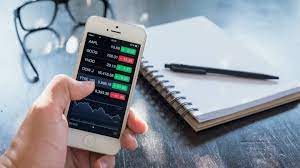Historically, due to the complexity of risk management in listed options trading, only institutional traders and market makers engaged in this activity, rather than the general public. It is now possible to open an options paper trading account online and study the ins and outs of trading options through online tutorials. Options paper trade simulators are similar to demo accounts offered by forex brokers in that they allow you to hone your skills before you put any real money on the line. Nevertheless, there’s nothing wrong with a little competition when it comes to investing, especially considering that none of your real money will be subject to the outcome of the game. Continue reading to find out which platform and app for paper trade or trading options would be the most suitable for you.
What is Paper Trade?
A paper trade is a virtual transaction in which a trader engages in virtual buying and selling without actually exchanging any real money. Before the advent of a widespread Internet trading platform, ambitious traders would “paper trade” to hone their skills before investing real money in real markets, hence the name. Paper traders keep comprehensive records of their hypothetical deals, portfolios, and gains or losses while they are still learning the ropes. These days, a stock market simulator that appears and acts like the real thing is used for most practice trading.
You can hone your skills in options trading through the use of paper trade, which eliminates the anxiety and stress associated with the real-world trading experience.
Furthermore, paper trade is not only a great method to understand the fundamentals of options trading, but it’s also a great opportunity to test out new trading tactics without having to worry about real-world consequences.
What Can You Learn From Paper Trade?
The paper trade is now more accessible than ever thanks to the proliferation of an online trading platform and app. Trading on a virtual account is a great way to test the viability of an investment strategy before putting any money on the line. TradeStation, Fidelity, and thinkorswim from TD Ameritrade are just a few of the online brokers that provide clients with access to paper trading simulators.
For instance, TD Ameritrade’s paperMoney® lets users experiment with investment strategies and options without risking real money.
The simulator is functionally identical to their robust thinkorswim trading platform, with the exception that the investor is not trading with real money.
To get the most out of paper trade, you should make investment decisions and place transactions in accordance with real trading methods and goals. The paper trader needs to keep the same risk-reward ratio, investment limitations, and time horizon in mind that they would with a real trading account. It wouldn’t make much sense for a cautious long-term investor to engage in frequent short-term trades in the style of a day trader, for instance.
Furthermore, many types of market situations are suitable for paper transactions. An example would be a trade executed in a very volatile market, when the gaps between bid and ask prices would be much larger than in a calmer market. When a price difference exists between the time a trade initiates and the time it is executed, this is known as slippage.
Traders and investors can practice placing stop-loss, limit, and market orders in a risk-free environment by engaging in virtual trading. In addition, several websites provide access to graphs, proposals, and news feeds.
Best Paper Trading Platform
Traders can practice on paper with a number of online brokerages. You should thoroughly consider your demands and the services each broker provides before deciding on one. Here is the best paper trading platform you might want to consider for your trading experience.
#1. Webull
Webull provides an easy-to-use practice paper trading platform. The app’s user interface is straightforward, allowing you to sign up for an account and begin trading in a matter of minutes.
If you have a valid passport or driver’s license, you can create an account on the Webull website and start utilizing the service immediately. You can use the Webull website to access the brokerage platform, or you can download desktop software for Windows or Mac.
In addition, you can practice stock trading anytime, anywhere with the help of apps available for both iOS and Android devices. Webull, like other stock trading simulators, provides real-time market data, news and analysis, and a suite of tools and indicators to its user base of active traders.
Trading with Webull fake money is a fantastic method to gain experience in the trading world without putting your own money at risk. The paper trading platform is great for traders of all experience levels since it provides them with everything they need to make knowledgeable transactions.
With over a hundred thousand different investments available, including ETFs, equities, options, and cryptocurrencies, Webull is an excellent platform to hone your paper trading skills.
#2. TradeZero
Client feedback on Trustpilot unanimously praises TradeZero as a top pick for an online stock trading company. TradeZero’s customer service has been rated 4.7 out of 5 for its promptness, friendliness, and expertise.
Furthermore, TradeZero is a broker with a variety of trading platforms aimed at novice traders. TradeZero is an online stock trading simulator perfect for first-timers who wish to learn the ropes.
A paper trading account allows you to practice stock trading without really spending any money. However, it’s important to remember that premium accounts come with a cost. TradeZero’s monthly fee of $79 is higher than the average free paper trading platform.
The paper trade is possible on both a PC and mobile app with TradeZero. You can trade wherever you have access to your phone because there is a native app for both iOS and Android. genuine-time market data is available on the paper trading platform, simulating the experience of trading with a genuine brokerage account.
If you have any questions or concerns, you may contact TradeZero’s support team at any time. The group has a wealth of expertise and is always willing to lend a helping hand to customers. You can contact them via phone, email, or real-time messaging.
If you choose this brokerage to participate in online paper trading, you will become part of a sizable community of traders. The brokerage can be found on Twitter, Facebook, and Instagram, among others.
The primary drawback to using TradeZero to learn how to trade is that it only allows stock trading. There are no other trading instruments available on TradeZero.
#3. Tradier
Tradier is an API-based trading solution that gives its traders a wide range of options and configurations.
However, using Tradier’s API, you may link up with numerous exchanges and leverage their trading services. Your trading experience can be tailored to your specific requirements.
The TradeHawk platform enables paper trading with Tradier, and it’s user-friendly and full of features that mimic a real-world trading environment. This is a fantastic opportunity for novice investors to practice their skills and ideas without risking any of their own money.
Both the Windows and Mac desktop versions of TradeHawk, as well as the mobile app, support the paper trade. Also, multi-portfolio views, options and spread charts, advanced analysis, and more are just a few of the trading capabilities included in TradeHawk 2.0.
Using TradeHawk will cost you money. You can pay $10 for software that takes a commission of $0.35 for every contract, or you can pay $85 for software that doesn’t take a commission.
There is also a desktop client and a mobile app available. If you’re a trader looking for a fully configurable paper trade app, this is it. Users can make orders for stocks, options, and other securities in real-time and view real-time market data. Articles, seminars, and video tutorials are just some of the many learning tools available from Tradier.
Also, users can benefit from these materials as they gain knowledge of the paper trading platform. You can also get advice on how to build a portfolio, what stocks to buy, and how to invest in the stock market.
#4. eToro
Due to its vast user base, cheap necessary initial investment, and intuitive interface, eToro has quickly become one of the most popular forex trading platforms.
eToro’s paper trade feature lets users practice trading equities, commodities, and currencies without risking money.
This is a great opportunity for novice traders to get experience without risking their own funds. To help users make smart trading decisions, eToro’s paper trade account gives them access to real-time market data and research.
eToro paper trading requires a free desktop account. You may alternatively use a native iOS or Android app for “paper trade.”
Your paper trading account has been pre-funded with $100,000. Contact eToro’s help desk and explain how much additional virtual money you need for trading. An additional $100,000 may be added at your request, bringing the grand total to $200,000.
The eToro digital account offers a minimalistic design that’s simple to use. Even if you’ve never handled a virtual portfolio before, you’ll have no trouble getting started. Investments in stocks, mutual funds, and digital currencies are all viable options. If you’re interested in short-term trading, eToro also has contracts for difference (CFDs).
Equity indices, digital currencies, foreign exchange, commodities, interest rates, and more are all included. eToro allows you to practice virtual trading on more than 3,000 different instruments.
Because eToro is a great site for copy trading, you may connect your eToro paper trading with other, more experienced traders and talk about trade techniques.
Copy trading helps beginner traders learn by letting them copy traders who are more knowledgeable. If you go from paper trading to real money trading on eToro, there are no account opening or management fees. Also, read WHAT IS PAPER TRADING? How It Works.
In addition, new traders can practice without risk with the eToro paper trading account.
#5. Interactive Brokers
When it comes to online brokers, many people turn to Interactive Brokers because of the breadth of markets it provides. Greenwich, Connecticut is home to the company’s headquarters since 1978.
Individuals, couples, families, businesses, and even trusts can all open accounts with Interactive Brokers. It also has a trading simulator that users can utilize to hone their trading skills.
When you open a paper trading account with Interactive Brokers, you may practice investing without risking any real money. This paper trading account’s account balance is one of its outstanding features.
While most virtual brokerages cap virtual trading accounts at $100,000, Interactive Brokers gives you a virtual $1,000,000 to practice with. That’s enough time to improve your trading skills and learn some important advice without risking your money.
The list of advantages of Interactive Brokers’ paper trading is lengthy. You can use Interactive Brokers to experiment with other markets, try out different order types, and get a feel for the powerful charting and analysis tools at your disposal.
Interactive Brokers also offers real-time charting and price risk analyses. Options paper trading is available with more than 130 markets on this platform, so you may practice trading and gain experience with this popular financial product.
Unfortunately, not all order types, including Auction and Passive Relative, are supported on the Interactive Brokers paper trading platform. Additionally, you can’t trade mutual funds using this platform. Despite these drawbacks, Interactive Brokers remains an excellent platform from which to acquire and hone trading expertise.
The paper trade software like that offered by Interactive Brokers makes it easy to practice trading without risking real money.
You can try out different techniques and order kinds to see how they would have performed in real-world scenarios because the simulator is so realistic.
#6. AvaTrade
AvaTrade is the next paper trading platform on our list. To name a few, it is authorized to do business by the Financial Sector Conduct Authority of South Africa, the Australian Securities and Investments Commission, and the Central Bank of Ireland.
With AvaTrade’s paper trading demo account, you may practice trading without risking any of your own money. Here, you can get familiarity with the market at no risk to yourself.
To give you a feel for what it’s like to trade with AvaTrade, the simulator replicates real-world market circumstances. Opening a practice account is simple, and then you may start paper trading equities, currencies, cryptocurrencies, indices, and commodities.
You can trade with assurance at the brokerage because you have instantaneous access to comprehensive market data and expert analysis. You may trade over a thousand different instruments, including all of the major cryptocurrencies.
The AvaTradeGO app allows users to trade on the go, and it’s compatible with both iOS and Android devices. Also, the AvaTrade WebTrader platform is also available for use on a computer.
If you want to gain experience in the markets without taking on any financial risk, AvaTrade paper trade is the way to go. To begin trading for real, a minimum deposit of $100 is required to open a genuine account.
How Do I Start to Paper Trade?
Learning the ins and outs of trading stocks, bonds, etc. through “paper trade” is a great way to get your feet wet. It’s a great way for traders to practice and learn about the stock market without risking their money. Using pen and paper is the simplest form of paper trading practice. Some guidelines for getting started with paper trading are provided below.
- Create a buffer for your investment by writing down a specific sum of money, preferably a round number like $100.
- The following step is to make a list of the assets you intend to buy. You’re free to pick only one asset, however, diversification is advisable.
- Include today’s price of assets next to your favorite assets’ names.
- Your whole investment should be split among the assets you’ve picked.
- Take into mind the small commission that most stock trading accounts will charge you.
- The final step is to round the investment amount down to the nearest dollar amount based on the current share price.
- Check the asset price every day after the market closes to keep tabs on your portfolio’s progress.
These days, several brokers offer paper trade platforms and even live trading rooms online. To get started in the world of investing, you can use any of the top paper trade platforms.
Paper Trade App
Put on the brakes. That’s a terrible plan since you’ll be caught off guard by everything you haven’t thought about. There is a deluge of new traders entering the market, and the vast majority of them are failing miserably.
However, with one little adjustment, you may sidestep those standard traps. Start by opening a “paper trading account,” where you can practice trading without risking any of your own money.
Demo or “paper” trading accounts are widely used in the world of finance. The allure is obvious; it shows that the broker has faith in their service enough to give a trial period. If the demo goes well, the user is more likely to move on with a real account.
And while business transactions have always moved quickly, the advent of globalization and immediate communication has accelerated the pace even further. The value of having a solid, responsive mobile app is difficult to overestimate.
You should be well-versed in a brokerage’s platform, investing options, research tools, and more before making any firm commitments. Here is the best paper trade app you might consider before you go all in to trade.
#1. FXCM
The FXCM Forex app is a great option if you want to practice buying and selling currencies on paper. In the realm of online and mobile trading, this app stands out as a prime choice, particularly for currency transactions. Numerous major, minor, and exotic currency pairs will be available to you.
Not only is there no commission to trade certain currency pairings, but the spreads are some of the tightest you’ll find anywhere. You can use leverage to trade any combination you like. Whether you are a retail or institutional client, as well as where you are located, will determine your trading limits.
The actual paper trade app has a $20,000 virtual balance that may be used right away. Use it with foreign exchange or contracts for difference (CFDs), or any other asset class you like. At FXCM, you can also engage in trading via the MT4 platform. After signing up with FXCM, all you have to do to start trading is download the MT4 software and access it from your mobile device. Considering this is a good idea because MT4 has so many useful features, such as the option to use trading robots.
Also, if you want to switch to trading for real money, you’ll need to put $360 into your FXCM account. This drops to just $50, though, if you happen to be located anywhere outside the European Union or the United Kingdom. Debit/credit card, bank wire, and electronic wallet payments are all acceptable. The FXCM app is extremely secure, with features like a complete license from the FCA.
#2. IG
IG is an excellent option to consider if you’re looking for a paper money trade app that works well on Android devices. This broker has been around since 1974, and it recently became public. More than 10,000 stocks and 17,000 CFD trading marketplaces are available to you through this supplier. Furthermore, IG’s paper trading service is not accessible for FX or equities, but rather only for CFDs.
Stocks, precious metals, energy sources, bonds, indices, and more are all included. All market orders in the demo account mimic real-world trading conditions, and the demo account’s starting balance is $10,000 in paper funds. Commission-free CFD trading is available to more than 239,000 customers who have already signed up for a real money account.
Stock CFDs are the only exception to this rule and they charge a percentage-based cost. All CFD markets offer leverage, and spreads are razor-thin across the board. At IG, the standard fee for trading traditional shares is $10. This drops to $4 each month if you’re able to make at least three trades within that time. IG has two distinct trading platforms, both of which are mobile-friendly.
Both MT4 and IG’s proprietary platforms are supported. To open a real account, you’ll need to place a deposit of $250. Payment options accepted by IG include debit/credit cards and bank wire transfers. Android is the only platform supported for adding funds to your account. It should go without saying that IG is subject to stringent oversight on all fronts. There is no need to worry about security because both the FCA and the ASIC have issued licenses.
#3. Forex.com
Forex.com is your best bet if you want to learn about the multi-trillion dollar foreign exchange market. However, this forex expert provides access to its paper trade platform in both web and app formats. Over ninety different currency pairs are available to you.
The Forex.com mobile app is ideal for more unusual currency pairs in addition to the standard ones. Also, the Forex.com app offers a paper trading account so you may try it out risk-free. There is a 30-day trial period for every new account, which is more than enough time to learn the app’s features.
This paper trade app includes numerous helpful functions. Along with leverage, this entails the use of technical indicators and charting tools. If you’re American, you already know that the maximum leverage on majors is 1:50 and even lower on other pair kinds.
When using a bank wire to fund your Forex.com mobile app paper trading account, there is no set minimum deposit required. There is a $50 minimum for deposits made using debit or credit cards. You can open either a commission-free or a normal account, depending on your preferences and needs. If you go with the latter, you’ll pay an extra $5 per regular lot, but your spreads will be much tighter.
Does Forex Have Paper Trading?
Yes, with a FOREX.com virtual account, you can begin paper trading in a matter of minutes. You can practice trading on any of the more than 13,000 markets and use any of the full suites of tools, including TradingView, Trading Central analysis, and more, with a demo account. Start practicing your trading skills with $10,000 in virtual funds by signing up for a paper trading account today.
Does Binance Do Paper Trading?
Paper trading is possible on Binance by use of the Binance Spot Test Network. However, Binance accounts do not need to generate Spot Test Network API credentials.
How Do I Start Paper Trading in Binance?
Go to Binance Futures in your personal browser to gain access to paper trading on the Binance website. After that, provide Testnet access to the email address that is connected to your Binance account in the same manner as you did for the Binance mobile app. If you follow these steps, the Binance website will grant you access to its paper trading platform.
What Are the Benefits of Paper Trading?
Here are some of the advantages of paper trading.
#1. The Risk-Free Way to Master Trading
New investors can learn the ropes of the trade and get a feel for the stock market by practicing on paper. However, the potential for financial loss is a major deterrent to beginning trading. You can make trades safely and securely on the online platform. Discover which investment approach best suits your company by trying out a variety of methods. You can gauge your own trading prowess and compare it to that of other users on this platform.
#2. The Capacity to Make Errors
You can make errors and gain valuable experience with paper trading without risking any real money. That’s a huge plus, sometimes the only plus. Of course, every trader and investor makes errors and makes incorrect judgments sometimes, but it is our ability to learn from these that will help us reach our goals.
#3. Opportunity to Attempt Various Strategies
Options, value, international, commodities, bonds, and mutual funds are all types of investments. Each option has benefits and drawbacks, and you can test out as many of them as you like using paper trade. Much of investing involves analytical work, and virtual trading allows you to try out many approaches until you find one that works for you.
What Are the Drawbacks of Paper Trading?
Here are some of the disadvantages of paper trading.
#1. The State of the Market Is Not Always Accurate
In the paper trade, market conditions are not always reflective of reality. For instance, the delay in such trade can range from 30 minutes to several hours. In other words, the market conditions you encounter during live trading will affect your trading results even whether you have a real-time trading account or program.
Overall, the conditions will be different while exchanging paper money as opposed to actual money because stress and emotions are intertwined. Online trading, for instance, might give you greater freedom and calm while making a choice. However, your plan may change in the real world of business, where a number of subjective considerations will weigh more heavily than you’d like.
#2. Individual Trades Have No Effect on the Market
The fact that your transactions in paper trade have no real-world repercussions is a huge drawback. If a stock is trading 400,000 shares each day, for instance, you should know that volume is the primary factor in the trading of most corporations. Therefore, if you are investing, you are putting in a $9 stock. So, if you invest $100,000 or $200,000 into that stock, and with that trade, it’s extremely likely that the stock price will either go up when you buy or down when you sell.
Conclusion
Every day, traders make and lose countless billions of dollars in the financial markets. It’s natural to feel apprehensive about risking your entire savings on something you know nothing about if you’ve never invested before.
To test the waters and acquire a feel for the markets before making a serious investment, a paper trading account is ideal. When you are ready to make a commitment, you will be efficient to move forward with confidence and succeed.
Keep in mind, though, that this may cause you to place too much faith in the market. The risk of loss is inherent in any investment. Quick deals like the ones you make when paper trading might be very risky. If you are risk-averse or have a shorter time horizon until retirement, a passive robo adviser can help you maximize your savings.
Paper Trade FAQs
What is paper trading in crypto?
The term “crypto paper trading” refers to the practice of investing in cryptocurrency through virtual trades. You can gain experience trading without putting your money in danger while you gain a better understanding of the market. The term “crypto paper trading” originates from a term used in the stock market.
Can you make money from paper trading?
Not at all, because it’s not real money. The most significant benefit of paper trading is the training it gives to novice traders. Anyone can practice with a mock stock market first, then move on to the real thing, where actual money is at stake.
Similar Articles
- MARKETING TRENDS in 2023: What You Should Know!!.
- Stock Trading Business: How to Start a Stock Trading Business
- HOW TO DAY TRADE: Complete Guide to Day Trading for Beginners
- HOW TO WRITE A WHITE PAPER: Step-By-Step Guide
- BEST JOBS FOR THE FUTURE: Ultimate Guide






